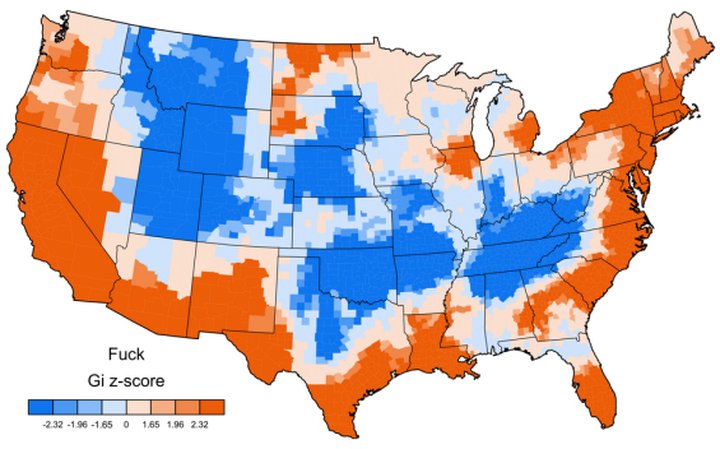There ought to be a room in every house to swear in because it’s dangerous to have to repress an emotion like that.
— Mark Twain
###
Living in Old Town Eureka, and usually having the windows open, we get to regularly listen to “real language” — what grammar proscriptivists derisively term “gutter language.” A foreigner staying here and unfamiliar with English might, therefore, assume that the word “fuck” was one of the most important words in the language: in its pure ejaculatory form as an interjection (“Fuck!”); imperative form* (“Fuck you!”); a straight-up adjective “fucked” (“That’s so fucked!”); present participle, used adjectively for emphasis (“You’re a fucking dick/twat/asshole!”); simple noun form (“You’re a fuck”) along with several variations such as “fucker” (my practical understanding of astronomy was helped when someone explained why a star seen though a telescope was still just a tiny point of light: “A hundred times fuck-all is still fuck-all”); and not forgetting such handy variations as the maternal “motherfucker,” the derisory “fuckup,” the directional “fuck off,” the philosophical “Who gives a fuck?” and so many more.
* Properly parsed, “Fuck you!” isn’t an imperative unless you rephrase it as the anatomically unlikely “Go fuck yourself!” It’s really just an epithet, or (if you insist) a quasi-verb. Ditto “Fuck me!”
Part of the attraction of the uninflected word comes from its nice vocalization: the noisy, anticipatory fricative “f” (start of many interjections: Fiddlesticks! Fudge! Foul! Freeze! Fore!) followed by that easy, wide open vowel [ʌ] and ending with the back-of-the-tongue plosive, or stop, “k.” Taken together, it makes for a deliciously satisfying sound: a single brief syllable encompassing a bounty of phonetics.
Sometimes (rarely) one gets to hear several of fuck’s many forms creatively used en masse, as it were: “The fucking fucker’s fucked!” Usually though, its multiple variations are ignored, simplicity and economy winning out, as in Hugh Grant’s entire dialog for the first five minutes of Four Weddings and a Funeral: “Fuck fuck fuck fuck fuck fuck fuck fuck fuck fuck fuck fuck fuck fuck fuck.” (The alarm clock had failed to wake him.)
Fortunately, said foreigner is unlikely to hear “fuck,” alone or in one of its many variations, and then head out onto 2nd Street to try out their newly-found linguistic ability (“A fucking good morning, madam!”) — since the word is known pretty much the world over to be taboo. Or if not taboo, at least, to be only used judiciously, for emphasis when nothing else will quite do (“So really, just how bad is global warming?” “Fucking bad!” “Will it cost a lot to fix it? “A fuck of a lot!”).

Color-coded map of the regional use of “fuck” in tweets 2013-2014 (from a corpus of 8.9 billion words). Red is more, blue is less. [Jack Grieve, Aston University, Birmingham, UK]
All of which begs the question, “What about its (presumed) original meaning, i.e. to copulate?” Wikipedia helpfully informs us that the earliest known use of fuck’s sexual connotation is found in English court records of 1310, when a man from Chester is alluded to as “Roger Fuckebythenavele.” Wiki adds, “Either this refers to an inexperienced copulator, referring to someone trying to have sex with the navel, or it’s a rather extravagant explanation for a dimwit, someone so stupid they think that this is the way to have sex.” (Having never, to the best of my memory, attempted sexual congress with a navel, I’m not qualified to comment.) Nowadays, though, isn’t “fuck,” in its copulative sense, dying out? The last time I heard “Wanna fuck?” was in Tarantino’s Jackie Brown. (5 stars!)
So anyway, how the fuck are you? [Spellchecker suggestion: How the fucks are you?]
CLICK TO MANAGE